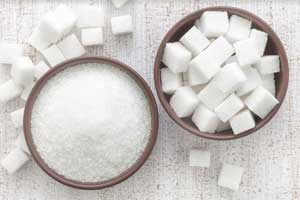- Home
- Editorial
- News
- Practice Guidelines
- Anesthesiology Guidelines
- Cancer Guidelines
- Cardiac Sciences Guidelines
- Critical Care Guidelines
- Dentistry Guidelines
- Dermatology Guidelines
- Diabetes and Endo Guidelines
- Diagnostics Guidelines
- ENT Guidelines
- Featured Practice Guidelines
- Gastroenterology Guidelines
- Geriatrics Guidelines
- Medicine Guidelines
- Nephrology Guidelines
- Neurosciences Guidelines
- Obs and Gynae Guidelines
- Ophthalmology Guidelines
- Orthopaedics Guidelines
- Paediatrics Guidelines
- Psychiatry Guidelines
- Pulmonology Guidelines
- Radiology Guidelines
- Surgery Guidelines
- Urology Guidelines
No assured health benefits of Artificial sweeteners, find researchers

There is no assurance on the health benefits of Artificial sweeteners as researchers don't find any compelling evidence to indicate important their health benefits. At the same time, their potential harms cannot be ruled out, suggests a review of published studies in The BMJ.
Growing concerns about health and quality of life have encouraged many people to adopt healthier lifestyles and avoid foods rich in sugars, salt, or fat. Foods and drinks containing non-sugar sweeteners rather than regular ("free") sugars have therefore become increasingly popular.
Although several non-sugar sweeteners are approved for use, less is known about their potential benefits and harms within acceptable daily intakes beacuse the evidence is often limited and conflicting.
To better understand these potential benefits and harms, a team of European researchers analysed 56 studies comparing no intake or lower intake of non-sugar sweeteners with higher intake in healthy adults and children.
Measures included weight, blood sugar (glycaemic) control, oral health, cancer, cardiovascular disease, kidney disease, mood and behaviour. Studies were assessed for bias and certainty of evidence.
Overall, the results show that, for most outcomes, there seemed to be no statistically or clinically relevant differences between those exposed to non-sugar sweeteners and those not exposed, or between different doses of non-sugar sweeteners.
For example, in adults, findings from a few small studies suggested small improvements in body mass index and fasting blood glucose levels with non-sugar sweeteners, but the certainty of this evidence was low.
Lower intakes of non-sugar sweeteners were associated with slightly less weight gain (-0.09 kg) than higher intakes, but again the certainty of this evidence was low.
In children, a smaller increase in body mass index score was seen with non-sugar sweeteners compared with sugar, but intake of non-sugar sweeteners made no differences to body weight.
And no good evidence of any effect of non-sugar sweeteners was found for overweight or obese adults or children actively trying to lose weight.
The researchers point out that this is the most comprehensive review on this topic to date, and will inform a World Health Organization guideline for health experts and policymakers.
However, they stress that the quality of evidence in many of the studies was low, so confidence in the results is limited. And they say longer term studies are needed to clarify whether non-sugar sweeteners are a safe and effective alternative to sugar.
In a linked editorial, Vasanti Malik at Harvard T.H. Chan School of Public Health agrees that more studies are needed to understand the potential health effects of non-sugar sweeteners and to guide policy development.
Based on existing evidence, she says use of non-sugar sweeteners as a replacement for free sugars, particularly in sugar-sweetened drinks, "could be a helpful strategy to reduce cardiometabolic risk [chances of having diabetes, heart disease or stroke] among heavy consumers, with the ultimate goal of switching to water or other healthy drinks."
"Policies and recommendations will need updating regularly, as more evidence emerges to ensure that the best available data is used to inform the important public health debate on sugar and its alternatives," she concludes.

Disclaimer: This site is primarily intended for healthcare professionals. Any content/information on this website does not replace the advice of medical and/or health professionals and should not be construed as medical/diagnostic advice/endorsement or prescription. Use of this site is subject to our terms of use, privacy policy, advertisement policy. © 2020 Minerva Medical Treatment Pvt Ltd